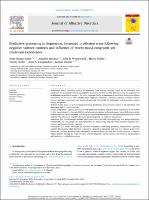| dc.contributor | Consorci Sanitari de Terrassa |
| dc.contributor.author | Ramos-Grille, Irene |
| dc.contributor.author | Weyant, Jennifer |
| dc.contributor.author | Wormwood, Jolie |
| dc.contributor.author | Robles, Marta |
| dc.contributor.author | Vallès, Vicenç |
| dc.contributor.author | Camprodon, Joan A. |
| dc.date.accessioned | 2023-06-22T08:46:44Z |
| dc.date.available | 2023-06-22T08:46:44Z |
| dc.date.issued | 2022-08-15 |
| dc.identifier.citation | Ramos-Grille I, Weyant J, Wormwood JB, Robles M, Vallès V, Camprodon JA, et al. Predictive processing in depression: Increased prediction error following negative valence contexts and influence of recent mood-congruent yet irrelevant experiences. J Affect Disord. 2022 Aug 15;311:8-16. |
| dc.identifier.uri | https://hdl.handle.net/11351/9854 |
| dc.description | Depression; Emotions; Facial Expression |
| dc.description.abstract | Background: Novel theoretical models of depression have recently emerged based on an influential new perspective in neuroscience known as predictive processing. In these models, depression may be understood as an imbalance of predictive signals in the brain; more specifically, a dominance of predictions leading to a relative insensitivity to prediction error. Despite these important theoretical advances, empirical evidence remains limited, and how expectations are generated and used dynamically in individuals with depression remains largely unexplored.
Methods: In this study, we induced facial expression predictions using emotion contexts in 34 individuals with depression and 34 healthy controls.
Results: Compared to controls, individuals with depression perceived displayed facial expressions as less similar to their expectations (i.e., increased difference between expectations and actual sensory input) following contexts evoking negative valence emotions, indicating that depressed individuals have increased prediction error in such contexts. This effect was amplified by recent mood-congruent yet irrelevant experiences.
Limitations: The clinical sample included participants with comorbid psychopathology and taking medication. Additionally, the two groups were not evaluated in the same setting, and only three emotion categories (fear, sadness, and happiness) were explored.
Conclusions: Our results shed light on potential mechanisms underlying processing abnormalities regarding negative information, which has been consistently reported in depression, and may be a relevant point of departure for exploring transdiagnostic vulnerability to mental illness. Our data also has the potential to improve clinical practice through the implementation of novel diagnostic and therapeutic tools based on the assessment and modulation of predictive signals. |
| dc.language.iso | eng |
| dc.publisher | Elsevier |
| dc.relation.ispartofseries | Journal of Affective Disorders;311 |
| dc.rights | Attribution-NonCommercial-NoDerivatives 4.0 International |
| dc.rights.uri | http://creativecommons.org/licenses/by-nc-nd/4.0/ |
| dc.source | Scientia |
| dc.subject | Depressió psíquica |
| dc.subject | Emocions |
| dc.subject | Expressió facial |
| dc.subject.mesh | Depression |
| dc.subject.mesh | Emotions |
| dc.subject.mesh | Facial Expression |
| dc.title | Predictive processing in depression: Increased prediction error following negative valence contexts and influence of recent mood-congruent yet irrelevant experiences |
| dc.type | info:eu-repo/semantics/article |
| dc.identifier.doi | 10.1016/j.jad.2022.05.030 |
| dc.subject.decs | depresión |
| dc.subject.decs | emociones |
| dc.subject.decs | expresión facial |
| dc.relation.publishversion | https://doi.org/10.1016/j.jad.2022.05.030 |
| dc.type.version | info:eu-repo/semantics/publishedVersion |
| dc.audience | Professionals |
| dc.contributor.authoraffiliation | [Ramos-Grille I] Departament de Psicologia Clínica i de la Salut, Universitat Autònoma de Barcelona, Catalunya, Spain. Servei de Salut Mental, Hospital de Terrassa, Consorci Sanitari de Terrassa, Terrassa, Spain. [Weyant J, Robles M] Department of Clinical and Health Psychology, Universitat Autònoma de Barcelona, Catalunya, Spain. [Wormwood JB] University of New Hampshire, Durham, NH, USA. [Vallès V] Servei de Salut Mental, Hospital de Terrassa, Consorci Sanitari de Terrassa, Terrassa, Spain. [Camprodon JA] Division of Neuropsychiatry, Massachusetts General Hospital, Harvard Medical School, Boston, MA, USA |
| dc.identifier.pmid | 35550829 |
| dc.rights.accessrights | info:eu-repo/semantics/openAccess |

 Private area
Private area Contact Us
Contact Us







